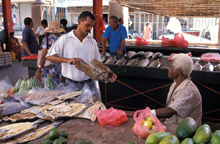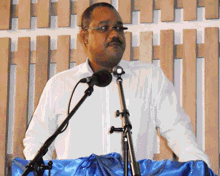
Typical street scene in Santa Ana, El Salvador. (Photo: iStock)
IMF Survey: Economic Reforms Helped Seychelles Weather Two Crises
November 10, 2010
- Move to float exchange rate was most critical decision Seychelles took
- Capacity building still an area that needs urgent attention
- Vital to consolidate macroeconomic stabilization, second-generation reforms
- National Assembly Speaker Herminie at symposium: Seychelles’ arrangements with IMF brought country’s boldest-ever reforms (photo: Rainer Koehler/IMF)
Economic reforms helped Seychelles weather both a severe debt crisis and the global financial crisis, an economic symposium in the Indian Ocean island nation heard.

Fish stall in Victoria, Seychelles: economy has recovered on pickups in tourism, foreign investment, domestic activity (photo: Sergio Pitamitz/Newscom)
IMF SUPPORT FOR AFRICA
Seychelles’ 2008 reform program included a decision to float the exchange rate—the most critical move in the country’s policies to address the crises, the meeting was told.
The 1st Economic Symposium for Parliamentarians, held in Victoria, Seychelles, brought the islands’ legislators together with IMF staff to take stock of achievements and assess remaining vulnerabilities facing the country. Jointly organized by the Seychelles authorities and the IMF, the October 20 event also discussed global and regional economic prospects and the priorities for small island economies.
Since independence in 1976, Seychelles—an archipelago of about 115 islands in the middle of the Indian Ocean—had built up a successful economy, supported by a growing tourism sector. But a combination of overly expansionary fiscal and monetary policies, a pegged exchange regime, and a complex system of exchange controls, state subsidies and financial sector restrictions culminated in a severe balance of payments and public debt crisis in the second half of 2008.
Seychelles’ subsequent default on its external debt led to a fundamental reform program supported by the IMF, first through $26 million Stand-by Arrangement, and then by a $31 million Extended Fund Facility.
The symposium was held as the authorities and the IMF completed their 2010 Article IV consultation—the regular economic health check that the IMF carries out with each of its member countries, and Seychelles’ first Article IV consultation since the crisis.
Critical decision
Vice President and Finance Minister Danny Faure recalled that when the government of Seychelles decided to embark on the reform program in October 2008, the move to float the exchange rate was the most critical decision Seychelles had to take. This was a historic time when the parliamentarians had risen to the occasion and amended the country’s Central Bank Act accordingly, Faure said.

National Assembly Speaker Herminie
at symposium: Seychelles’ arrangements
with IMF brought country’s
boldest-ever reforms
(photo: Rainer Koehler/IMF)
Faure also noted that parliamentarians from both sides of the legislature had voted in favor of the reforms and enacted new laws that were needed for the reforms to take effect. Thanking the lawmakers, Faure said the government and parliaments still needed to address outstanding issues, and singled out capacity building as one of the areas needing urgent attention.
Speaker of the National Assembly Patrick Herminie said Seychelles’ engagement with the IMF had helped to change the mindset of the authorities from being “proponents of welfarism” to being “fervent promoters of entrepreneurship.” Economic reforms enacted with the IMF’s support had helped the country weather both a severe debt crisis and the global financial crisis, Herminie said.
Boldest reforms ever
Seychelles’ arrangements with the IMF had brought about the boldest reform program ever undertaken in the country, Herminie stated. With IMF support, the Seychellois government had removed all exchange restrictions, floated the currency, liberalized interest rates, introduced a modern monetary framework, and significantly tightened fiscal policy.
IMF mission chief for Seychelles Jean Le Dem stressed the importance of consolidating macroeconomic stabilization gains and second-generation reforms. He noted that the Seychelles economy proved resilient to the global economic crisis of 2009 and has rapidly recovered in 2010 on the back of a rebound in tourism, sizeable foreign direct investment, and a widespread pickup in the domestic economy.
Real GDP was now projected to grow at more than 6 percent in 2010. Using cross-country comparisons, Le Dem underlined the need to address the substantial external vulnerabilities that a small island state like Seychelles confronted, including through rebuilding policy buffers, catching up with infrastructure investment, and completing pro-business tax reforms including the introduction of a value-added tax.


